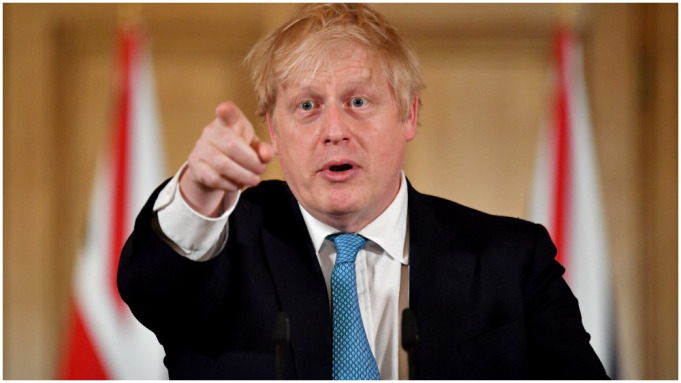On the one hand, the Government labels China as the biggest state-based threat to the UK’s economic security. On the other, it promises to continue its pursuit of deeper trade links and increased Chinese investment in the UK.
History teaches us that dealing with autocratic regimes is never easy. They tend to be erratic and ignore the rules of conduct that everyone else takes for granted. All your assumptions go out the window and democratic countries that believe in the rule of law sometimes flounder. But if we’ve learnt anything from recent experiences with Russia and China, it must surely be that countries like the UK need to be clear, unambiguous, determined and consistent. Anything else is taken as a sign of weakness.
That is why I am so disappointed by the UK Government’s new Integrated Review, which was published this week. Boris Johnson has been bigging it up as signifying a major strategic reassessment of the UK’s new post-Brexit global role, but for all the usual Boris flag-waving and fanfare, the paper once again demonstrates that the UK government’s policies towards China are riddled with contradictions, with major implications for how Britain will engage with the rest of the world.
Yes, it’s probably sensible that we in the UK “tilt” a bit further to the Indo-Pacific, if that means that we intend to embrace our likeminded democratic partners in the region. I hope it also means—although you have to read between the lines to get a sense of this—that the UK intends to join efforts to counter Beijing’s increasingly aggressive behaviour in the South China Sea. It stands to reason that India as the world’s largest democracy is a key ally in these efforts.
Allies in the Indo-Pacific may also hope to benefit from promises made to increase the UK’s supply chain resilience, which must realistically entail finding and strengthening supply chains outside China in the region as well as building more production capacity in the UK (for instance for vaccines). It is no secret, for instance, that the UK’s reliance on Chinese imports was dangerously exposed in shortages of personal protective equipment during the onset of the global pandemic. As Beijing’s punitive trade sanctions on Australia have demonstrated, we cannot depend on the Chinese Communist Party to be the gatekeeper of our critical goods.
All this would seem to suggest that the UK Government is finally beginning to realise the challenge that the Chinese state poses to Britain’s values and security, at home and abroad.
If only, is my reaction. Because it still feels as if the Government wants to have it both ways. On the one hand, the Government labels China as the biggest state-based threat to the UK’s economic security. On the other, it promises to continue its pursuit of deeper trade links and increased Chinese investment in the UK. Yet again Prime Minister Johnson is attempting to have his cake and eat it. Some might call that realpolitik. I just call it naïve and duplicitous weakness. After all, this is the same man who had to admit that he was a fool when he thought he could reset the relationship with Putin’s Russia. Yet at least he seems to have learnt his lesson there. The UK has sanctioned Russian officials for the poisoning of opposition
And yet Johnson still refuses to hold the Chinese government to the same standards as the rest of the world. No sanctions have been issued on Chinese officials for the genocide in Xinjiang and the EU looks set to use its human rights sanction regime to target China before the UK does.
So too in Hong Kong, the Chinese authorities have made a mockery of the Sino-British Joint Declaration. Opposition politicians have been arrested en masse and the city’s democracy all but dismantled. Yet it is Washington, not London, that has sanctioned the Chinese government officials responsible. Foreign Secretary Dominic Raab’s words on Hong Kong have done nothing to hold Beijing to account for its violations of international law. It is difficult not to conclude that Britain’s promises to the people of Hong Kong have been abandoned in favour of a greedy pursuit of trade with China whatever the costs to democracy.
Equally concerning is the government’s lukewarm response to the increasingly brazen approach of Chinese state activity on British soil. The government publicly recognises Chinese state backed cyber-attacks on UK businesses and public bodies. It has heard evidence of attempts by Chinese government agents to intimidate and threaten UK residents, including Uyghurs, Hong Kongers and the British Chinese community. Despite this China is conspicuously absent from the government’s list of states engaged in hostile state activities, in contrast to Russia, Iran and other states that habitually target UK citizens.
How this will all play out is anyone’s guess. But my fear is that the UK has identified the major threat from China, but is too fearful of losing trade to do anything about it. I think they’ve got this all wrong. The only way to deal with authoritarian regimes is to stand firm, to form strong international alliances and reinforce the rule of law. The UK’s post-Brexit future must lie in our age-old defence of human liberty and the rule of law, not in selling out to the highest bidder.
Chris Bryant is a Labour Member of Parliament sitting in the British House of Commons. He is a member of the Inter-Parliamentary Alliance on China (IPAC).

